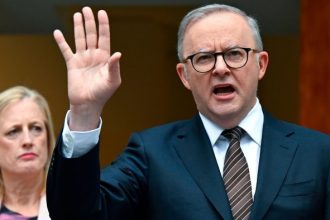Stay informed with free updates
Simply sign up to the War in Ukraine myFT Digest — delivered directly to your inbox.
The EU has agreed a new package of sanctions against Russia that for the first time targets Chinese and Indian companies accused of supporting Moscow’s war effort.
The measures, which will be the 13th package of sanctions imposed by Brussels in response to Russia’s full-scale invasion of Ukraine, target close to 200 individuals and entities but stop short of any sweeping economic action targeting crucial industrial sectors.
“We must keep degrading [Vladimir] Putin’s war machine . . . [and] keep the pressure high on the Kremlin,” European Commission president Ursula von der Leyen said in response to the sanctions agreement on Wednesday, adding that the measures also aimed to target “Russia’s access to drones”.
EU officials are also discussing a further package of sanctions in response to the death of Russian opposition leader Alexei Navalny in a Siberian prison last week. The UK has imposed sanctions on six managers of the prison colony where Navalny died.
The inclusion of Chinese and Indian companies comes as the EU and its G7 partners attempt to crack down on Russia’s use of third countries and transit routes to evade existing curbs designed to hamper its war economy.
Brussels had abandoned plans to sanction mainland Chinese companies under pressure from member states including Germany that were fearful of antagonising Beijing.
But Russia’s continued ability to produce large numbers of drones, missiles, tanks and other weapons despite extensive western trade bans has put pressure on G7 capitals to step up their anti-evasion efforts.
The measures will target three companies in mainland China and one in India, alongside businesses in Sri Lanka, Turkey, Thailand, Serbia and Kazakhstan, according to documents seen by the Financial Times.
The targeted businesses will be hit by trade restrictions after being identified as helping to supply equipment, particularly electronics and microchips, used by Russia to manufacture weapons or other equipment used in its war against Ukraine.
“It is also appropriate to include on that list certain other entities in third countries that indirectly support Russia’s military and industrial complex . . . by trading in such components, the sanctions proposal said.
The agreement by EU ambassadors on Wednesday will allow the measures to be formally approved ahead of the second anniversary of Moscow’s full-scale invasion on February 24. The names of the individuals and entities will be published when the sanctions package appears in the EU’s legal journal.
The new package will raise the total number of individuals and entities sanctioned by the EU in response to Russia’s aggression against Ukraine to about 2,000.
The agreement was reached after Hungary last week dropped its opposition to the package.
EU diplomats on Wednesday also agreed not to renew sanctions against Arkady Volozh, founder of Russian tech giant Yandex, when they expire next month, according to two people familiar with the matter.
The move would make Volozh, who last year condemned Putin’s “barbaric” invasion of Ukraine, the first person to be removed from EU sanctions lists after speaking out against the war.
The UK last year removed sanctions against fintech tycoon Oleg Tinkov, the only other major Russian businessman to have criticised the invasion. The EU has lifted sanctions against a small number of Russian businessmen and their relatives following legal challenges, though none had spoken out against the war.
Volozh, who moved to Israel after Putin annexed the Crimean peninsula in 2014 and has not visited Russia since its full-scale invasion of Ukraine, was sanctioned in 2022 for what the EU described as Yandex’s complicity in the war, prompting him to resign as chief executive and transfer voting rights from his controlling stake to the board.
“Evidence against him was deemed weak, hence the delisting,” said a person briefed on the matter. The European External Action Service did not respond to a request for comment. Volozh did not immediately respond to a request for comment.
The lifting of sanctions would allow Volozh to help grow a group of internationally focused tech start-ups which are staffed by about 1,300 Russians who left the country after the outbreak of war. Yandex’s Nasdaq-listed parent company agreed to spin off the companies as part of a deal to sell its Russian operations.
Read the full article here




